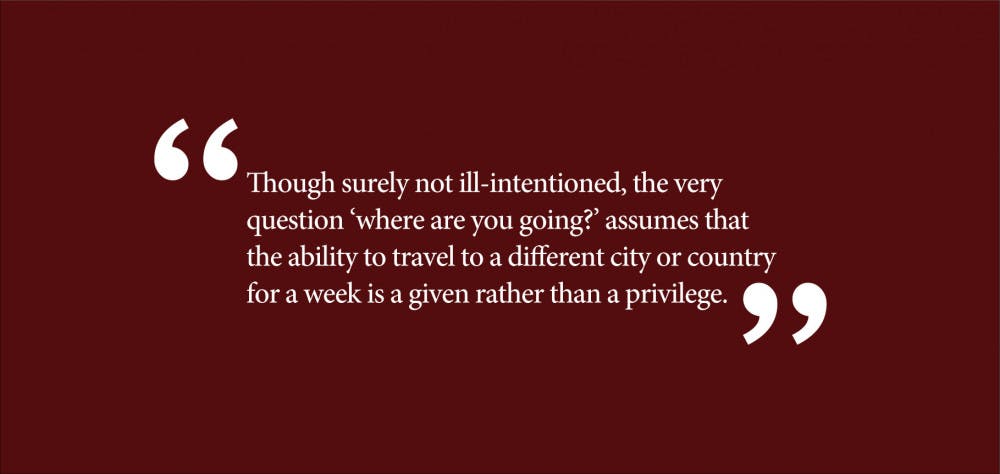With the start of classes this past Monday, another spring break has come and gone as Brown students embark on the homestretch before the end of the semester. Though the time off from class was universally awaited, the stereotypical portrait of college spring break as a week for students to travel is something of a social construct that accentuates the unmistakable air of privilege on Brown’s campus.
Two weeks ago, a professor of mine prompted class discussion by having us go around the room and tell the rest of the class “where we were going for spring break.” Some students were indeed going to distant places; Miami, Mexico, even Paris. But many, if not the majority of students, were going home or staying on campus for the week. What was intended as a bonding exercise for the class instead created a divide between students.
This is not the first situation I have experienced at Brown where people have misconstrued what spring break signifies for most students — merely a week away from class. Though surely not ill-intentioned, the very question “where are you going?” assumes that the ability to travel to a different city or country for a week is a given rather than a privilege. It also creates a hierarchy of exoticism; those who travel farther away are seen as having a ‘better’ break than those who do not.
Brown students hail from an array of geographic regions and socioeconomic sectors. This diversity allows for a wide range of perspectives on campus and promotes a positive sense of individuality. But when the median annual family income for Brown students is $204,200, the highest in the Ivy League, some permeation of privilege into Brown’s campus culture is inevitable. More students at Brown come from families in the top 1 percent of income earners than from the bottom sixty percent, so the apparent normalization of access and freedom to travel is understandable. Conversations about spring break merely highlight the ways we lump everyone into this statistic and are insensitive to the unique personal situations of students in which many are not able to travel or even return home for breaks. The privilege that undeniably exists on this campus is not necessarily to be demonized, but when it manifests itself in conversations that evoke exclusivity, it is demonstrative of the work that still needs to be done on campus. Specifically, we should be using our unique diversity to promote better self-awareness in our actions and conversations with others.
This is not just a matter of wealth. Universities across the United States are advising international students from target countries on which Trump has placed a no-entry ban not to return home for university breaks, for fear that these students will not be allowed to come back. Furthermore, many students may feel unsafe or unwelcome going home for breaks or perhaps not have a home to return to. Though there are no Brown-specific statistics available on housing for homeless students, the presence of homeless college students throughout some of the country’s most elite universities is a reality seldom acknowledged. We should keep these truths in mind during future group discussions.
Brown tries very hard to promote inclusivity, but that attitude starts at the student body level and, more specifically, through casual conversation and class discussion. The assumptions we make in these moments have the power to marginalize individuals and make them feel invisible or less than.
This is not a difficult attitude to adjust. Even changing the way we frame our questions from “where are you going” to “what are you doing” removes the expectation of privilege and opens up the dialogue to a broader range of subjects. Applying this to a general shift toward conscientiousness will help us remove the assumptions we place on others so that together we will be able to dismantle the hegemonic notion of spring break and enjoy the time off from class for what it is.
Anna B. Kramer ’20 can be reached at anna_kramer@brown.edu. Please send responses to this opinion to letters@browndailyherald.com and op-eds to opinions@browndailyherald.com.





